|
|
|
Sort Order |
|
|
|
Items / Page
|
|
|
|
|
|
|
| Srl | Item |
| 1 |
ID:
165588
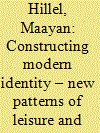

|
|
|
|
|
| Summary/Abstract |
This article explores the cultural transformation that unfolded in urban centres in Palestine during the British Mandate period. Focusing on the city of Haifa as a case study, the article sheds light on how imperial colonial interests prompted massive development of the city that triggered significant cultural changes. The article examines the ways in which different groups in Palestinian-Arab society were involved, and how they initiated, experienced and reacted to the cultural shifts. The rapid increase in the number of cafés, cabarets, bars and restaurants constituted the cornerstone of the commercial entertainment industry in Haifa during this period. By delineating the emergence of new entertainment patterns and recreation habits, the article shows how leisure became a central component in the daily lives of varied social groups. It argues that leisure played a major role as an agent of modernisation and functioned as an essential site for the construction of modern personhoods in Palestinian society.
|
|
|
|
|
|
|
|
|
|
|
|
|
|
|
|
| 2 |
ID:
107914
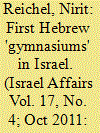

|
|
|
|
|
| Publication |
2011.
|
| Summary/Abstract |
This article traces the establishment and development of the first Hebrew 'gymnasiums' (academic high schools) during the years 1906-1948: Gymnasia Herzliya, the Hebrew Gymnasia in Jerusalem, and the Reali School in Haifa. It describes how they were set up during Ottoman rule, and their development during the British Mandate up to the establishment of the state, focusing on school culture as it was expressed in both the formal and informal educational systems.
|
|
|
|
|
|
|
|
|
|
|
|
|
|
|
|
| 3 |
ID:
146767
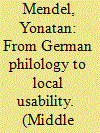

|
|
|
|
|
| Summary/Abstract |
This article examines the pedagogical shifts in the study of Arabic at the Hebrew Reali School in Haifa, the leading school for Arabic studies in the Jewish education system. Analyzing the moulding of Arabic studies in the crucial years of educational institutionalization (1913–48), it demonstrates an inevitable tension with regard to Arabic studies: between the German philological approach and the ‘practical’ approach. In light of this tension, it shows the gradual emergence of a new ‘practical’ approach in the Jewish education system in Palestine, which was not only the result of a clash between different pedagogical methods, but was propelled by another, powerful, clash: that of the heated political conflict in Palestine. Using primary sources from seven different archives, in Israel, Britain and Germany, this article reveals that the shift towards practicality was motivated by political developments and ideological shifts as much as by pedagogical considerations, and therefore has had significant ramifications for the emerging field of Arabic studies in Jewish schools in Palestine/Israel.
|
|
|
|
|
|
|
|
|
|
|
|
|
|
|
|
| 4 |
ID:
097518
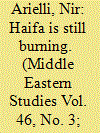

|
|
|
|
|
| Publication |
2010.
|
| Summary/Abstract |
The air raids against civilian and military targets during the Second World War have been a relatively unexplored chapter in Palestine's tumultuous history. This article examines the circumstances that led the air forces of Italy, Germany and Vichy France to launch attacks against Palestine. It surveys the damage these raids caused and assesses their effect on the country's population. The article raises three central arguments: although the attacks caused considerable damage in Haifa and in Tel Aviv, they failed to alter the course of the war in the Middle East; despite the hostility between Arabs and Jews before and after the war, the period of the air raids saw displays of solidarity between the two communities; and the experiences of the Second World War, including the air raids, played a part in the state-building process of the Yishuv (Jewish community).
|
|
|
|
|
|
|
|
|
|
|
|
|
|
|
|
| 5 |
ID:
146771
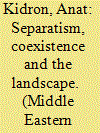

|
|
|
|
|
| Summary/Abstract |
Haifa was named a ‘mixed city’ by the British, who ruled Palestine from 1917 to 1948, in reference to the two national communities that inhabited the town. This definition was not neutral, and reflected the Brits aspirations to create national coexistence in Palestine among the diverse urban societies.
|
|
|
|
|
|
|
|
|
|
|
|
|
|
|
|
| 6 |
ID:
187003
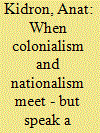

|
|
|
|
|
| Summary/Abstract |
This paper addresses the convergence of British colonialism and Zionist aspirations in Mandatory Palestine. As research so far explored this topic mainly as a confluence of colonial-national interests, this paper is an attempt to look at it from another vantage point, based on the different interpretations of European Modernism and Orientalism by these two groups. The new variable is the Zionist perception of nationalism, and its ties to European Modernism, which strengthened Zionist autonomy in a way that countered British interests to some extent and strengthened Zionist advantages in Palestine over Arab society. These processes were particularly prominent in mixed cities. Haifa was central to this concept as it was free of historical or symbolic baggage. The British developed Haifa as a strategic economic centre, and as a modern space. Promoting unilateral national interests was the very opposite of the British intention for the city. Yet, they allowed and even encouraged Zionist entrepreneurs to create an autonomous national community. We contend that the British had a certain blindness to the symbolic significance that the Zionists attached to the process of urban development, not only as a Modern-European development process but as a basis for national autonomy.
|
|
|
|
|
|
|
|
|
|
|
|
|
|
|
|
|
|
|
|
|